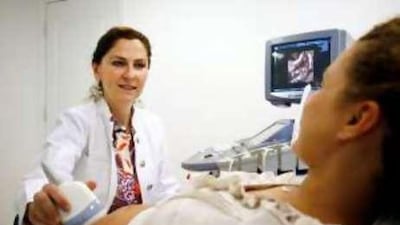ISTANBUL // As soon as Didem Eryarunlu knew she was expecting a child, her decision was clear. She wanted to give birth by Caesarean section, joining hundreds of thousands of other Turkish women who choose the same way of giving birth every year. "The most important reason was that there should be less of a risk for the baby, the baby should be healthy," said Ms Eryarunlu, a journalist in Istanbul, whose daughter was born five years ago. "I took the decision right at the start" of the pregnancy, she said. In Turkey, a country between East and West that has been going through an economic boom in recent years, Caesarean births are regarded as more contemporary, less painful and more manageable by many patients and doctors. But the government has been trying to reduce the number of Caesarean sections. Despite medical progress, the operations still carry risks, among them loss of blood and infections, the health ministry has said. Still, the operations are seen by many Turks as the way children are born in a modern country, experts say. "Medical institutions in general, physicians in particular, present Caesareans not as an operation that is necessary in rare emergencies, but as a 'normal' part of modern life that therefore can be 'elective'," said Dilek Cindoglu, a sociologist at Ankara's Bilkent University. While the World Health Organisation recommends a C-section rate of not more than 15 per cent, Turkey has had a rate of 38.4 per cent in the first seven months of this year, according to the latest health ministry figures quoted in the Turkish press. The rate in Turkey was 40.8 per cent in 2006, amounting to 288,000 children. In 2007, the rate was 32.8 per cent, or 251,000 births. Ms Eryarunlu said the most important reason for that development was the wish of women to reduce the risk for their children. Secil Bayrak, a 34-year-old in Istanbul who had a C-section for medical reasons, also said many decided to have the operation instead of going through a normal birth because they felt that it was "less risky, healthier and causes less deformation". The government has been trying to limit Caesarean births by cracking down on hospitals that show an unusually high rate of the procedure. After a private hospital in Ordu on Turkey's Black Sea coast reported a rate of 95 per cent last month, the health minister, Recep Akdag, ordered an investigation. The ministry also published a booklet that stressed Caesarean operations should not be regarded as a simple alternative to normal births. But experts say the trend will be hard to stop. Normal births are hard to plan, may last for hours and can cause much pain for the mother, but Caesarean operations are often considered an attractive choice. "A normal birth lasts eight to twelve hours, but a Caesarean is over in 25 to 30 minutes," said Kubra Taman, an obstetrician and gynecologist in Istanbul. She prefers normal births, but she said some of her patients changed their minds before the due date and opted for a C-section. In addition, some doctors were guiding patients towards a Caesarean by stressing possible problems that can occur during a natural birth, she said, "sometimes by inventing reasons". "For the doctor, [a Caesarean] is much, much easier, because you know the date, you can plan your holiday, you can do it during the day, instead of the middle of the night", as is sometimes necessary in normal births, Dr Taman said. According to Bulent Urman, a doctor at the American Hospital in Istanbul, another reason for Turkey's high rate of Caesareans is that healthcare providers pay for Caesareans without checking medical factors. "Especially in private hospitals, health insurance companies do not ask why a Caesarean was done," Dr Urman told the Turkish newspaper Aksam. Statistics also show big regional differences in the rates. While 45.3 per cent of all births in the capital, Ankara, were performed by C-section in the first seven months of this year, that figure was only 10.1 per cent in the province of Agri, a rural and much poorer region in eastern Turkey. The trend towards Caesarean operations was not only supported by doctors, but also by women and men themselves, Dr Cindoglu said. Many women did not regard normal births as "normal" any more, while many men had the unrealistic idea that a woman should remain "as if she had not given birth". The media were presenting Caesarean births as a "natural solution" in this situation. Dr Taman said that women, especially those from higher social classes, were concerned that a normal birth would tear apart tissues and widen their vagina. "The higher the social layer, the more concerns about tissue," she said. "This mentality of women and men has not changed," Dr Cindoglu said. Pressures that led to a drop of Caesarean births in the United States, like checks by healthcare providers and campaigns by women's groups, were lacking in Turkey. "More information has to be [made] available by physicians in the media for women about the risks and the side-effects of Caesarean operations as well as natural births, lack of information scares women and results in elective C-sections," she said. Dr Taman said she has detected early signs of a countermovement that is moving away from C-sections and towards natural births. "The main reason is that people try to emulate the US and Europe," where Caesarean rates are much lower than in Turkey. But those women are still a minority, Dr Taman said. "Mentalities will have to change." tseibert@thenational.ae

Mothers choose knife over natural birth
Turkish women are increasingly opting for Caesarean section, often without any medical justification.
Most popular today
